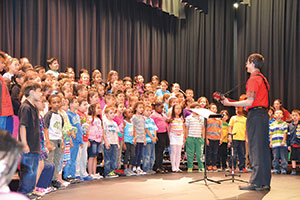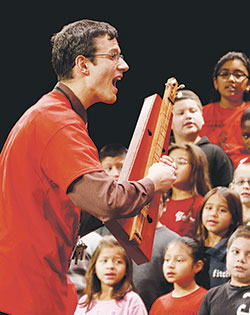
East Somerville Community School music teacher Adam N. Epstein is especially dedicated to bringing out the talents of his students.
— Photo by Claudia Ferro
By Cathleen Twardzik
Adam N. Epstein, M.M.Ed., K to 8 Music Teacher at the East Somerville Community School (ESCS), does so much good for the students at that school.
Epstein has been a music teacher at ESCS for three years for grades K to 8. However, his experience spans from teaching infants to college undergraduates.
Each year, Epstein organizes the winter concert and the spring concert. Each student at ESCS has a chance to perform during those concerts. Students display their music learning in general, as well as instrumental and vocal skills.
Late October brings the Harvest Parade, in which Epstein leads younger students. The parade ventures to the Windsor House Adult Day Care, which is close by, and ESCS students give an informal performance.
In addition, he has taken part in All-City Ensembles concerts, which are district-wide, the Choral Festival and the Band Festival, as well as heading a few field trips to yearly area concerts.
Epstein serves as the co-organizer of the African-American History Month and Memorial Day Assemblies “with colleagues from other disciplines.”
At ESCS in grades K to 6, Epstein teaches general music, which includes listening to and analyzing music, playing instruments, composing and improvising music, singing, reading notation and learning about the history and culture, which is connected with music.
In grades 7 to 8, he teaches drumline, chorus, and World Music Ensemble, which includes marimbas and hand drums, as well as additional instruments from around the world.
Outside of school hours Epstein teaches chorus, which is at the elementary-level.
This summer, he will teach at the Kennedy School at the Somerville Strings Camp.
While Epstein was completing his Master of Music in Music Education (MMEd.) degree, he worked in the Boston Public Schools through the Community Music Center of Boston’s Schools Outreach Program. Then, the year before his time at ESCS, he taught K to 6 music in the Troy, NY City School District. Epstein has studied for many years to become a professional percussionist.
 His accomplishments as a teacher are great. “As a music teacher, I often encounter the myth that the ability to make music is limited to a select minority of talented individuals. A major focus of my career has been to show students that the ability to make music is an innate human right, just like the ability to speak a language. Everyone is born with different aptitudes in various areas of life and learning, but with hard work in the context of a sequential curriculum, everyone can learn how to perform, read and create music,” said Epstein.
His accomplishments as a teacher are great. “As a music teacher, I often encounter the myth that the ability to make music is limited to a select minority of talented individuals. A major focus of my career has been to show students that the ability to make music is an innate human right, just like the ability to speak a language. Everyone is born with different aptitudes in various areas of life and learning, but with hard work in the context of a sequential curriculum, everyone can learn how to perform, read and create music,” said Epstein.
“My most important accomplishments as a teacher are all my students, the musical skills they develop and the personal rewards they experience, as a result,” he said.
The Somerville Public Schools (SPS) music department mission statement reads, “As music educators, it is our mission to inspire and guide every student in active music making through the use of a sequential and creative curriculum that nurtures the human spirit and promotes cultural understanding.”
“I decided to become a teacher while on a study-abroad trip to India. I was doing ethno-musicological research on participatory religious music. While interviewing both amateur and professional musicians, I found that many of them had a strong passion for preserving their musical cultures for future generations. They had a keen awareness that if they didn’t do this work, [then] their traditions might die,” said Epstein.
“I also saw, from an outsider’s perspective, how many of the essential parts of their culture were passed down in schools. I realized two things: it is important to me, as a musician, to perpetuate the experience of active music-making in my home culture and this sort of work is most effectively done in public schools. As a life-long musician who had experience and interest in many instruments and styles, I’m primarily a percussionist, and as someone who previously considered a career in social work, becoming a public school music teacher felt like the job I was born to do,” he said.
A brief time after that “realization,” Epstein was accepted at The Boston Conservatory.
“The best and most important part of being a teacher is the relationships one has with the students. This personal connection is essential to creating a positive and effective learning environment. I love to see students grow over the course of one or several years, to see them accomplish things they never thought they could, and to see them come to understand that hard work is the key factor in their success. My motto is ‘You can do it. I will not give up on you.’”
In the future, Epstein will continue to make ESCS shine. “I have been delighted to see the quality of our concerts increase in the last three years. I am looking forward to the continuation of that trend. I am always interested in providing more opportunities for our students to make music together joyfully. I am interested in organizing/having a role in events where students are sharing their music-making with students from different schools,” he said.















Reader Comments